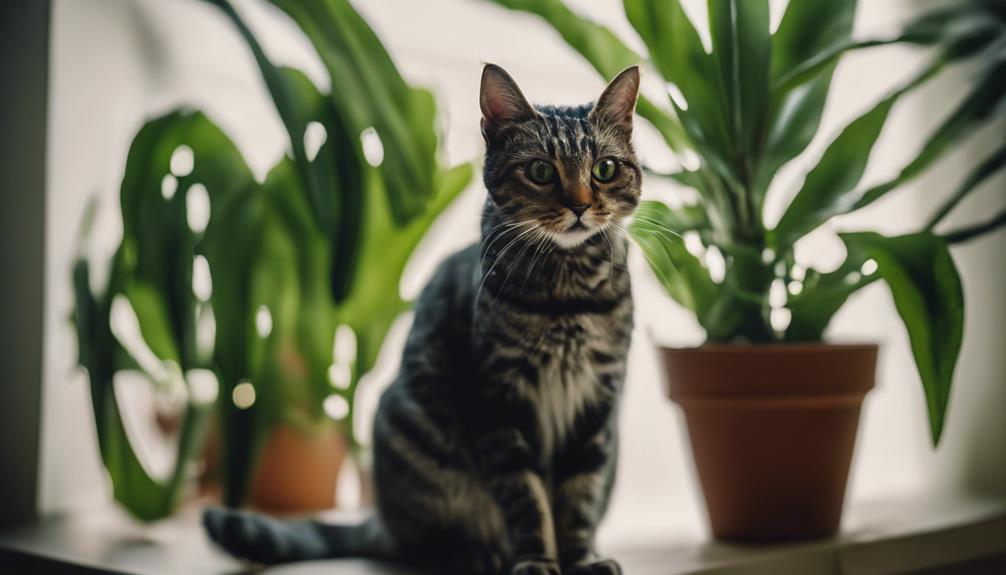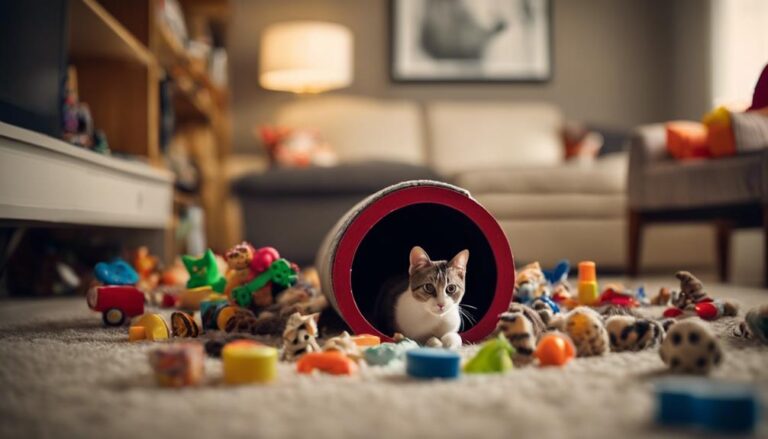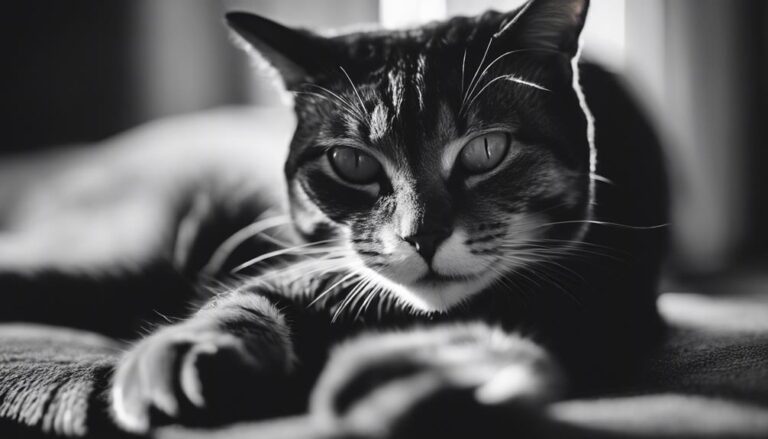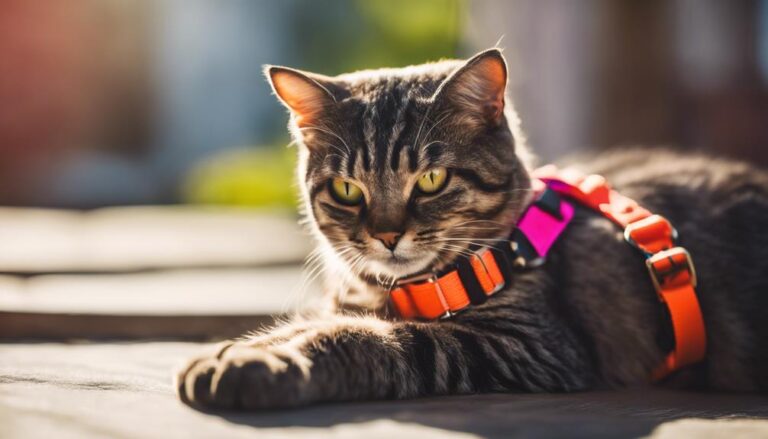If you find yourself constantly battling your feline friend's plant-chewing habits, there are practical strategies you can implement to safeguard your greenery. By understanding your cat's behavior and preferences, you can tailor your approach to deter them effectively. From creating a cat-friendly garden to incorporating enrichment activities, there are various methods at your disposal. Stay tuned to discover simple yet effective ways to keep your plants intact and your kitty content.
Understanding Your Cat's Plant Eating Behavior
If your cat is munching on your plants, understanding their plant-eating behavior is essential to address this behavior effectively. Cats eat plants for various reasons, including health issues like dental problems or stress, highlighting potential underlying problems that require attention. Sometimes, cats may seek extra nutrients or fiber from plants, indicating possible dietary deficiencies that need to be addressed. Additionally, boredom, lack of attention, curiosity, or specific plant preferences can lead to plant nibbling, underscoring the importance of providing mental stimulation for your feline friend.
To tackle behavioral problems related to plant eating, it's crucial to ensure that the plants in your home are safe for cats. Regular vet check-ups can help identify and address any health-related reasons for this behavior, emphasizing the importance of seeking veterinary guidance. Moreover, providing safe alternatives like catnip or cat grass can help deter plant chewing and satisfy your cat's natural instincts. Remember, training your cat to focus on these safe options can promote a healthier environment and discourage plant munching habits.
Creating a Cat-Friendly Garden
When creating a cat-friendly garden, focus on cat-safe plant choices like catnip and rosemary.
Use natural deterrents like citrus peels or aluminum foil to discourage cats from munching on your plants.
Providing cat grass can also help satisfy their urge to chew on greenery.
Cat-Safe Plant Choices
Choosing cat-safe plants for your garden is essential in creating a safe and stimulating environment for your feline friend. Here are some options to consider:
- Catnip: A favorite among many cats, catnip is a safe and enjoyable plant for your pet.
- Silver Vine: Similar to catnip, silver vine can provide entertainment and enrichment for your cat.
- Cat Thyme: This plant offers a safe alternative for your cat to explore and interact with in the garden.
- Rosemary: Not only a flavorful herb for your cooking, but also a safe option for your cat to investigate without harm.
Deter Cats Naturally
To naturally deter your cat from munching on your plants, consider creating a cat-friendly garden with safe alternatives and enrichment options. Plant cat-friendly herbs like catnip, silver vine, and cat thyme to offer safe munching alternatives. Incorporate rosemary as a diversion plant, steering your cat away from toxic options.
Integrate cat grass and cat-safe plants to enrich your garden, providing entertainment and stimulation for your feline. Encourage play sessions and offer diversions within the cat-friendly garden to keep your pet engaged and less interested in other plants. By implementing these strategies, you can help deter your cat from nibbling on harmful plants, ensuring a safe environment for both your pet and your garden.
Provide Cat Grass
Consider incorporating cat grass, such as wheatgrass or oat grass, into your cat-friendly garden as a safe and appealing alternative for your feline to munch on. Cat grass provides numerous benefits for your cat and can help stop them from eating your other plants. Here's why you should provide cat grass:
- Cat grass, like wheatgrass or oat grass, offers a safe option for cats to nibble on.
- These grasses aid in digestion and prevent hairballs in cats.
- Growing cat grass indoors is easy and adds an interactive element to your cat's environment.
- By offering cat grass, you can redirect your cat's chewing behavior away from your houseplants.
Providing Enrichment and Distraction
To prevent boredom and discourage your cat from munching on your plants, engage them with interactive toys and regular play sessions. Incorporate feather wands or cat toys to provide mental stimulation and distract your cat from the plants.
Spend 5-10 minutes daily engaging in vigorous play to help deter your cat from nibbling on your greenery. Place cat-friendly plants such as catnip or pet grass in your cat's lounging spots to redirect their interest towards these safe options.
Additionally, provide solo toys for your cat's engagement and entertainment, reducing their inclination to eat plants. By offering a variety of interactive toys and ensuring daily play sessions, you can keep your cat mentally stimulated and physically active, ultimately decreasing their desire to snack on your plants.
Making Plants Inaccessible
To keep your plants out of your cat's reach, consider using elevated plant stands to place them higher up.
You can also try using a citrus scent deterrent near your plants to discourage your cat from getting too close.
If you're looking for cat-safe alternatives, consider adding some cat-safe plants that won't harm your furry friend.
Elevated Plant Stands
Placing your plants on elevated stands can effectively prevent your curious cat from reaching and munching on them. To make your plants inaccessible to your feline friend, consider the following:
- Elevated Plant Stands: These stands keep your plants out of reach, deterring cats from accessing leaves and vines.
- Hanging Baskets: Opt for hanging baskets as they're a good way to prevent cats from munching on your plants.
- High Shelves: While high shelves may work, they may not always deter climbing cats, so it's wise to explore other options.
- Home Safety: Using elevated plant stands is beneficial, especially if your home isn't completely cat-proofed yet.
Citrus Scent Deterrent
Consider incorporating citrus scent deterrents to make your plants unappealing to your cat's nibbling tendencies. Cats have a natural aversion to citrus scents like orange, lemon, and grapefruit, making them effective deterrents for plant munching.
Placing citrus peels or using citrus sprays in the plant soil can help repel cats and protect your plants. The strong aroma of citrus is known to discourage cats from approaching or chewing on the greenery. Using citrus-scented deterrents is a safe and non-toxic method to prevent your cat from snacking on your plants.
Cat-Safe Plant Alternatives
For making your plants inaccessible to your cat, explore cat-safe plant alternatives that can satisfy their chewing instincts. Consider the following alternative options:
- Catnip: A favorite among many cats, catnip can provide a safe outlet for your cat's chewing urges.
- Silver Vine: Another excellent choice to divert your cat's attention away from your houseplants.
- Cat Thyme: This safe plant option can offer enrichment and entertainment for your feline friend.
- Rosemary: Not only a safe plant for cats, but it also adds a pleasant aroma to your indoor garden.
Using Aversion Techniques
Wondering how to deter your cat from munching on your plants? Aversion techniques can help with that. Using deterrent sprays, noises, or distractions can discourage your cat from snacking on your plants. Clapping your hands or saying 'No!' can redirect your cat's attention away from the plants when you catch them in the act. If needed, water bottle sprays can serve as a last resort to deter plant munching, but remember to avoid spraying directly at your cat's face.
Consistency and patience are essential when using aversion techniques to modify your cat's behavior. By employing these methods, you can break the habit of plant snacking and protect both your furry friend and your beloved plants. Remember, it may take some time for your cat to learn, so be persistent and gentle in your approach.
Establishing Alternative Plant Options
To provide your cat with safe and appealing greenery options, consider offering cat-friendly plants such as catnip, silver vine, cat thyme, and rosemary.
- Create a cat-friendly garden: Designate a specific area with cat-safe plants to redirect your feline's attention away from your other houseplants.
- Provide enrichment options: Include interactive toys, climbing structures, and puzzle feeders to keep your cat entertained and mentally stimulated.
- Offer play opportunities: Engage in regular play sessions with your cat using toys like feather wands or laser pointers to reduce their interest in nibbling on plants.
- Satisfy natural instincts: By establishing alternative plant options, you can help fulfill your cat's innate need to explore and interact with greenery, ultimately decreasing their plant-chewing behavior.
Frequently Asked Questions
How Do I Stop My Cat From Chewing on My Plants?
You can prevent your cat from chewing on your plants by offering cat-friendly alternatives like catnip or pet grass, using citrus scents to repel them, placing decorative rocks on soil, and providing safe chewing options.
How Do I Stop My Cat From Messing With My Plants?
To stop your cat from messing with your plants, try hanging baskets, citrus scents, vinegar-soaked cotton balls, or offering safe plants like catnip. Use consistent training, distractions, and aversion methods to redirect your cat's attention effectively.
Why Is My Cat Obsessed With Eating My Plants?
Your cat may munch on plants due to health issues, seeking nutrients, boredom, or plant preferences. If this persists, consult a vet for proper diagnosis and treatment. Address underlying health concerns or provide alternative activities to deter plant nibbling.
How Do I Get My Cat to Stop Touching My Plants?
To get your cat to stop touching your plants, try cat-safe deterrent sprays or citrus scents, offer safe plants like catnip, play daily with your cat, and place decorative rocks on soil. Consider using hanging baskets or high shelves.






